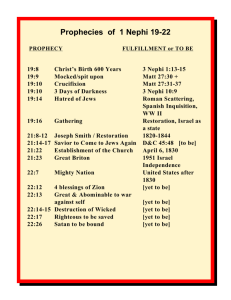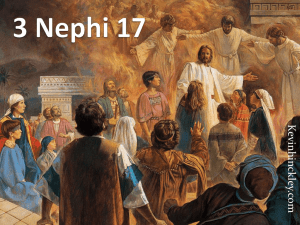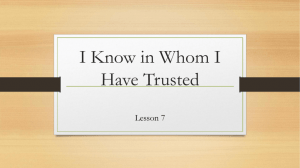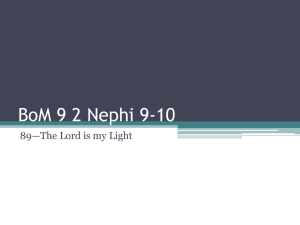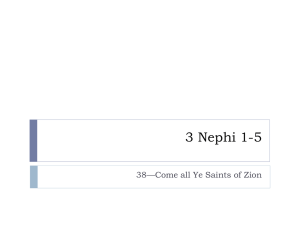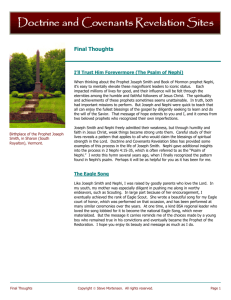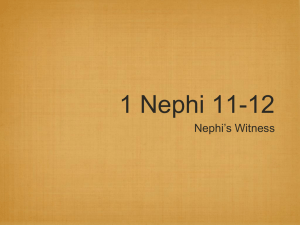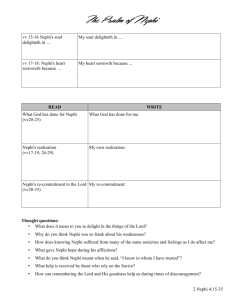2 Nephi 4-7
advertisement
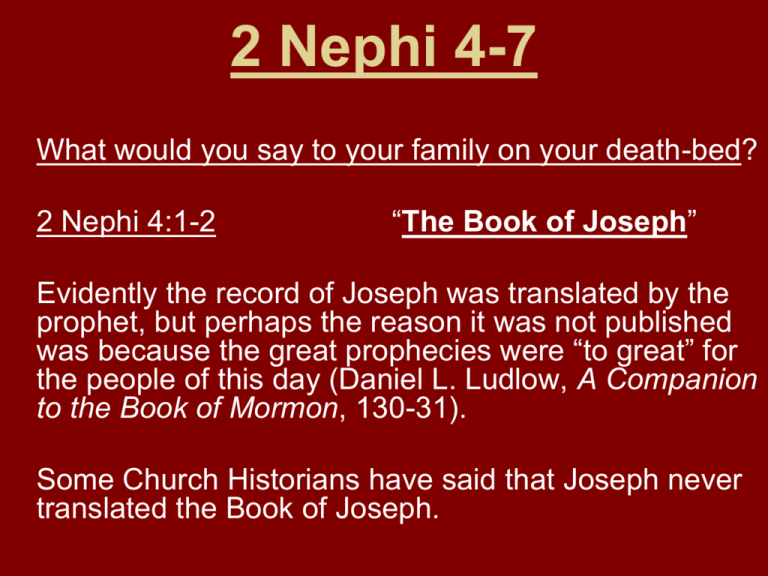
2 Nephi 4-7 What would you say to your family on your death-bed? 2 Nephi 4:1-2 “The Book of Joseph” Evidently the record of Joseph was translated by the prophet, but perhaps the reason it was not published was because the great prophecies were “to great” for the people of this day (Daniel L. Ludlow, A Companion to the Book of Mormon, 130-31). Some Church Historians have said that Joseph never translated the Book of Joseph. 2 Nephi 4:5 Proverbs 22:6 2 Nephi 4:6 “Be answered upon the heads of the parents” (D&C 68:25-30) (Proclamation #5) Teach your children these eight things: 1. 2. 3. 4. 5. 6. 7. 8. Faith in Jesus Christ Repentance (Atonement) Baptism Holy Ghost Work Observe the Sabbath Day Pray Be honest 2 Nephi 4:12 Lehi died! To the very end Lehi and Sariah kept their family together. 2 Nephi 4:15-35 “Psalm of Nephi” Song of Praise http://www.latterdayblog.com/files/BYU-Mens-Chorus-2-Nephi-4.mp3 v.17-18 “O Wretched Man that I am!” The nearer man approaches perfection the clearer are his views, and the greater his enjoyments, till he has overcome the evils of his life and lost every desire for sin, and the ancients, arrives at that point of faith where he is wrapped in the power and the glory of his maker and is caught up to dwell with him (Joseph Smith, Teachings, 51). The more spiritual and individual becomes, the more sensitive he becomes to his imperfections. The better he becomes, the worse he realizes he was. Perhaps Nephi felt burdened by what we might consider trivial weaknesses to the point where they cause him sorrow, and he sought to be free from any vestige of sin. Elder M. Russell Ballard "Recognize limitations; no one can do everything. When you have done the best you can, be satisfied and don’t look back and second-guess, wondering how you could have done more. Be at peace within yourselves. Rather than berate yourself for what you didn’t do, congratulate yourself for what you did" (Ensign, November, 95). 2 Nephi 4:17-19, 26-29 What kind of sins was Nephi guilty of? “Nephi’s references to personal sins should not be taken to imply any serious moral transgression on his part. No man could have seen and known God as he did who was not pure in heart. “Rather, he is almost surely alluding to the …. anger, impatience, and frustration he must have felt at times” (Rodney Turner, in Monte S. Nyman and Charles D. Tate Jr., First Nephi, 93). The more righteous a man becomes, the more clearly he perceives things (Teachings, 51). 2 Nephi 4:27-29 Who struggles to overcome sin? “The most noble of souls, the greatest of prophets, need heaven’s help to endure in faith to the end. Joseph Fielding Smith, even in his ninety-fifth year,…frequently said, ‘I pray that I may be true and faithful to the end’” (Joseph Fielding McConkie and Robert L. Millet, Doctrinal Commentary, 1:219). 2 Nephi 4:25 “Mountains” Perhaps many times! Don’t write it! 2 Nephi 4:35 Sound familiar? James 1:5 Is James writing specifically to Joseph Smith? (No James?) King Follett Discourse 2 Nephi 5:6 (Nephi’s sisters) I Nephi 7:6 2 Nephi 5:15 How is the phrase “to build buildings” evidence of the Book of Mormon authenticity? To “build buildings” (Mosiah 9:8; 11:13; 23:5), to have “dreamed a dream” (I Nephi 3:2; 8:2), and to “vow a vow” (Numbers 30:2) are all examples of a Hebrew literary construction called “cognate accusative.” Though English syntax avoids using such a construction, “Hebrew and other Semitic languages…encourage it… “…Therefore, in using the phrase ‘to build a building,’ the Book of Mormon adheres to a Hebrew and Semitic practice that is not common in English” (Paul Y. Hoskisson, in Monte S. Nyman and Charles D. Tate, Jr., eds., First Nephi, 288). 2 Nephi 5:21 “Skin of blackness” 2 Nephi 5:26 The Priesthood held by Lehi? President Joseph Fielding Smith wrote: “The Nephites were descendants of Joseph. There were no Levites who accompanied Lehi to the Western Hemisphere. Under these conditions the Nephites officiated by virtue of the Melchizedek Priesthood from the days of Lehi to the days of the appearance of our Savior among them (Answers to Gospel Questions, 1:124-26). 2 Nephi 5:28-32 When were Nephi’s plates made? “It is quite clear from 2 Nephi 5:28-33 that the small plates were not prepared until thirty years after Lehi left Jerusalem, or approximately 570 B.C.” (Daniel H. Ludlow, Companion, 134). 2 Nephi 6 Jacob began his writing. He taught from Isaiah and testified of Christ. 2 Nephi 6:8-9 When were the Jews “carried away captive,” and when were they to return? “Bible scholars recognize two great deportations. The first took place in the year 596 B.C…. “The second deportation took place in the year 586 B.C…. “They did return under Zerubbabel in 537 B.C.” (George Reynolds and Janne M. Sjodahl, Commentary on the Book of Mormon, 1:282). 2 Nephi 6:14 The Jews Are “Beginning to Believe” “Not may of the Jews, I take it from my reading of the scriptures, will believe in Christ before he comes. The Book of Mormon tells us that they shall begin to believe in him (2 Nephi 30:7). They are now beginning to believe in him. The Jews today look upon Christ as a great Rabbi. They have accepted him as one of their great teachers; they have said that, ‘He is Jew of Jew, the greatest Rabbi of them all,’ as one has stated it. When the gospel was restored in 1830, if a Jew had mentioned the name of Christ in one of the synagogues, he would have been rebuked. Had a rabbi referred to him, the congregation would have arisen and left the building. And so, we see the sentiment has changed. Now I state this on Jewish authority that they are beginning to believe in Christ, and some of them are accepting the gospel. “But in the main they will gather to Jerusalem in their unbelief; the gospel will be preached to them; some of them will believe. Not all of the Gentiles have believed when the gospel has been proclaimed to them, but the great body of the Jews who are there assembled will not receive Christ as their Redeemer until he comes himself and makes himself manifest unto them” (Joseph Fielding Smith, Doctrines of Salvation, 3:9). 2 Nephi 7:2 Christ asked, “Have I no power to deliver?” “Save for the exception of the very few who defect to perdition, there is no habit, no addiction, no rebellion, no transgression, no apostasy, no crime exempted from the promise of complete forgiveness. That is the promise of the Atonement of Christ” (Boyd K. Packer, Ensign, November 1995, 20). 2 Nephi 7:6 “I gave…my cheeks to them that plucked off the hair.” “Plucking the hair of a man’s face or beard was looked upon as a shameful way of degrading him (2 Samuel 10:1-4)….It is descriptive of the rude way in which (Christ) was treated by the Jews and the Romans during His final hours” (Hoyt W. Brewster Jr., Isaiah Plain & Simple, 211). (Matthew 26:67) 2 Nephi 7:11 What happens to those who walk in their own light instead of the Lord’s? “Those who kindle fires and gird themselves with firebrands --- that is, those who conspire evil and plan the destruction of the faithful or who walk by their own lights --- shall be trapped by their own snares. They shall come to a sorrowful end” (Sidney B. Sperry, Book of Mormon Compendium, 158). (D&C 133:71)
